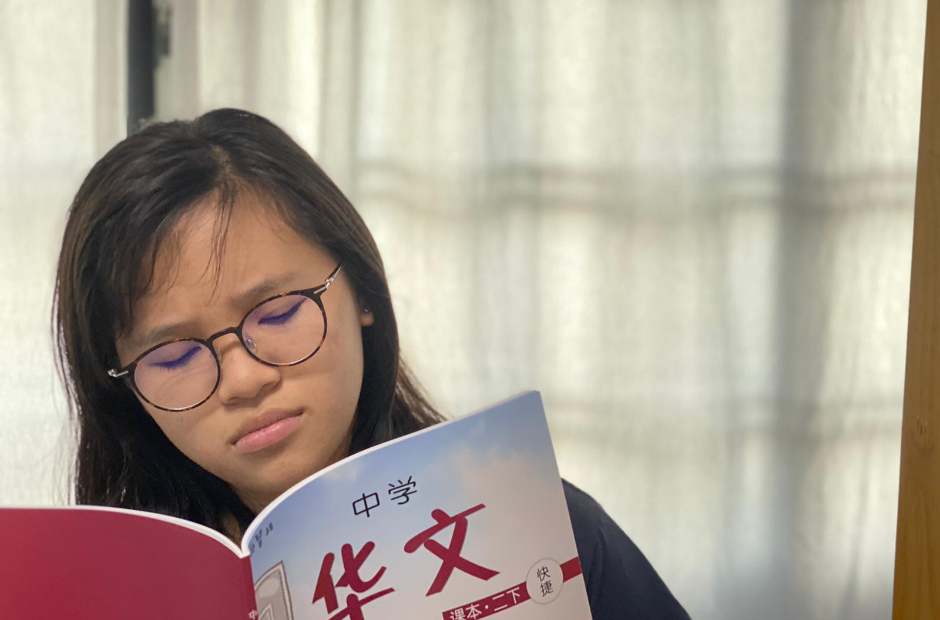With virtually no exposure to spoken Mandarin in our household, even with the grandparents, my seven- and 13-year-old daughters’ weakest subject in school is their mother tongue language. So, it came as no surprise when these learning struggles became more pronounced after my older daughter started secondary school last year.
After realising that her parents were just about as useful as an English dictionary when it comes to Secondary school-level Chinese, my older daughter started pestering us to get her a tutor.
“Since both of you can’t help me, can I have tuition, please? I think I am going to fail my Chinese exam,” she pleaded with us, before adding the kicker: “All my friends have Chinese tuition too, you know?”
Both my daughters are raised in a largely tuition-free environment. Other than a few months of tutoring support for my older daughter during Primary 6 after she missed months of school due to a medical problem, we have resisted the allure of leaving their homework and revision in the hands of private tutors.
Although our teenage daughter was now clearly struggling with her Chinese in secondary school, with all signs pointing to her failing the subject if nothing was done, we decided eventually not to accede to her request for tuition.
The decision was a straightforward one for my husband, who prefers to raise our children in a tuition-free environment.
I cannot say the same for myself as it took me lots of self-control not to cave in. To be honest, my daughter’s comment about her friends having tuition preyed on my anxiety that she would “lose out”.
What if she really fails her Chinese examination? Plus, how to keep relying on the Google Translation app for the rest of her secondary school days?
Why parents rely on tutors
Such parental anxieties have kept the private tuition industry here robust, despite the recent cut-back on examinations and even through the challenges of circuit breaker and safe distancing in 2020. After all, when there is demand, there will always be supply.
My experience shows that demand may not only come from parents but also from some students anxious to keep up with their peers with additional learning support outside of school.
The next question then is, why are we so reliant on private tutors?
Chats with friends reveal that some feel that their children are not motivated enough to study on their own. If left to their own devices and without consistent supervision, they fear their children would fall behind in school, perform poorly or fail to make the grade to move on to the next level.
Several felt that as parents, they would be doing their children a disservice if they do not do all they can to help “maximise their potential” with these extra nudges.
While there will always be that stereotypical “kiasu” parent, I feel it would be too simplistic to say that the fear of losing out is the sole factor driving the billion-dollar tuition industry, without taking into account the typical Singapore family lifestyle.
Stressed out and busy working parents have no time or energy to take on the extra task of monitoring their child’s school work. Younger children and those less motivated usually need some supervision. But if the parents (and I know quite a few like this) are returning home from work at around 7pm, 8pm, there is barely time left for dinner and a quick chit-chat with the children before they head to bed.
Plus, how does one have sufficient brain cells left on a regular work week to tackle a tricky upper primary level problem sum or go through an entire Comprehension passage?
Then there are others, like myself, who are clueless about the current academic syllabus for secondary school.
There is also the issue of parental guilt, which I believe many Singapore parents experience. Are we doing right by our children if we do not offer help or push them sufficiently to succeed, especially when we have the means to do so?
Persevering through uncomfortable moments
Like all parents, I want my children to become successful individuals and I make no bones about it.
But in recent years, thinking more deeply about the type of environment I want my children to grow up in has made me recalibrate what it means to “help” them along: Instead of always jumping in and rescuing them each time they face an uncomfortable learning situation, I have learnt to withhold help sometimes.
Because beyond doing well in school, what is more important to me is for my children to be able to take charge of their own lives and thrive. I want them to be self-directed, motivated and independent. These are also the very traits they would need to negotiate the speedbumps in their careers, life and relationships later on.
Research into child development shows that it is a misconception that a child’s intelligence or perceived talents count the most when it comes to successful learning.
Rather, understated traits like perseverance and persistence are the key to children’s intellectual growth, according to American psychologist Carol Dweck, who is well-known for her studies on human motivation.
When children are praised and motivated by the process, for example, persevering through challenges, putting in effort, persisting in solving a problem sum, rather than the outcome, they become better learners in the long run.
For that to happen, it would mean allowing my daughter to “struggle” (in manageable doses), giving her the time and space to make mistakes and learn from them without the hand-holding.
It would also mean that I might have to get comfortable with accepting some uncomfortable things; that my child could fail during certain parts of her learning journey.
We have gone through this. When my daughter did poorly in all her subjects in primary school, we let that awful feeling sink in and she realised that she didn’t like the feeling of not having done her best. She is usually a motivated student.
Having said that, I feel it is important as parents to check in with your child regularly while they ‘struggle’ so, together, you can review the strategies they are making, and recognise every improvement, however small.
So back to the tuition issue. After declining my daughter’s request for a Chinese language tutor, my husband went a step further by decisively informing her that it is unlikely we would engage a private tutor for any subject, unless there were very unusual circumstances causing her to miss weeks and months of school (touchwood!).
In a nutshell, she would have to rely on herself and her teachers in school if she wanted to do well.
Relooking learning strategies
How did she take it? Knowing that she would not be able to rely on tuition actually spurred my daughter to review her old revision strategies, which were far from ideal.
Previously, her default style was to “last-minute hug Buddha’s leg” (a direct translation of the Chinese idiom that refers to making a hasty last-minute effort) each time a test came up. She realised that an aversion to the subject was causing her to procrastinate, which she never did for her pet subjects.
Armed with that awareness, she started scheduling time on weekends to revise topics covered over the previous school week. The strategy was to be slow, steady and consistent, much like the Tortoise in Aesop’s fable.
When she could not read Chinese storybooks targeted at teens, we encouraged her to stick to the easier upper primary school-level novels or comics. Her school is also supporting by recommending books that are easier to read. They also get the students to read Chinese books and magazines on certain days.
As for her lack of exposure to speaking Mandarin, we tried conversing in the language more and watching Chinese TV dramas and movies together as a family.
There have been gradual improvements. For example, she can read a Chinese newspaper article more easily now, something which used to be impossible. Her commitment to revision was evident as she did well for certain sections of her secondary 1 year-end Chinese examination.
Having said that, the process is no walk in the park. She still struggles to complete her Chinese homework, trips over pronunciation and is barely passing her composition tests.
Meanwhile, I still occasionally daydream about handing her over to a tutor who might magically help her ace the subject.
But I will not do that in real life. Instead, I will put my trust in the process, in the hope that the lessons my daughter gleans from the discomfort she faces now will fortify her against other learning challenges down the road.






